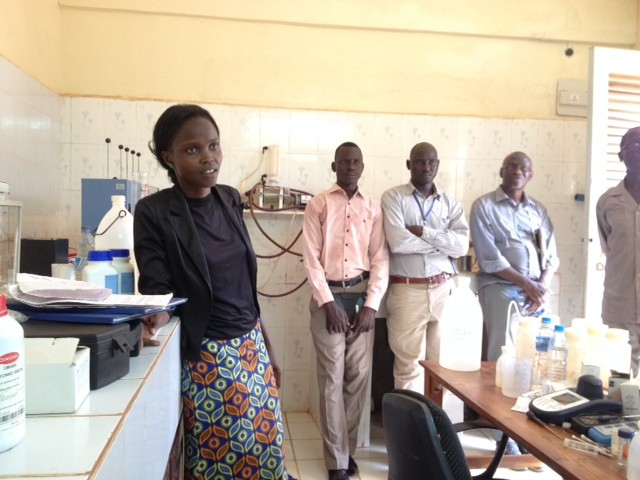
Jan. 2015—Even before the current crisis in South Sudan erupted in December 2013, more than 30 percent of the population did not have access to safe water supplies and only 13 percent had access to adequate sanitation facilities. These conditions have led to high rates of infant and child mortality and outbreaks of cholera and other diseases related to poor access to water, sanitation and hygiene.
In the past year, the conflict has uprooted more than 1.9 million people, and access to safe water and sanitation has become even more precarious for the people of South Sudan.
USAID has been working in South Sudan and across sub-Saharan Africa to help meet these challenges in the face of recent and ongoing conflict through programs that support infrastructure and sustainable water and sanitation. In rural areas, efforts are focused on establishing new water points and keeping the systems operational. In urban areas, new ways to improve the operations of water companies are being devised to reach growing populations.
Wau, South Sudan, is one of those growing cities. The administrative headquarters of Western Bahr El Ghazal State, Wau has grown from an estimated population of 150,000 in 2008 to 250,000 today. People displaced by conflict and those who returned to South Sudan after years of living in Khartoum and other Sudanese cities during prior conflicts have swelled Wau and overstretched existing resources.
Following a severe cholera outbreak in 2006, USAID began the next year to provide support for clean water in Wau, starting with rehabilitating and expanding the city's non-functioning water treatment plant to double its capacity to produce clean water. Today the plant—owned by the Wau Urban Water Corp., the only water utility in Wau—can produce 6,000 cubic meters of water, enough for about a quarter of Wau's population, who previously lacked reliable access to safe sources of water.
The corporation now provides clean water for an average of 15 hours a day and can pay for more than 75 percent of its operating costs with customer revenue thanks to assistance with construction, maintenance and staff training. USAID is currently working on ways to sustain the plant’s operations, including how to pay for fuel—a significant expense in South Sudan.
Tivo Abowro Chol, head of the corporation’s lab, is responsible for ensuring water quality. She conducts daily and weekly checks at various points along the distribution system, testing for harmful bacteria and factors such as pH levels, turbidity, color and residual chlorine. An assistant keeps detailed records and performs any remedial treatment needed to keep the water safe. The lab, part of the infrastructure support, began operating in 2012.
A recent analysis of 10 countries by the International Water Association, with funding from USAID, shows that the water, sanitation and hygiene sector in Africa is suffering from human resource gaps and that women have largely been excluded from entering the sector and contributing to planning, implementation and operations of water supply and sanitation management. In South Sudan, Chol is extraordinary for her key role in an urban utility. Social and cultural practices, compounded with the impact of conflict in South Sudan, make it particularly difficult for a woman to rise to such a key position.
To help build staff knowledge in Wau, USAID supported a partnership between the Wau Urban Water Corp. and the National Water and Sewerage Corp. of Uganda. Experienced Ugandan staff came to Wau in 2012 to share their expertise with their South Sudanese counterparts, and staff from Wau traveled to Uganda to see how a well-functioning utility operates
“Staff of the Wau Urban Water Corporation are now working as a team,” says Chol. “We are trying our best to keep our plant working because we don’t want to go back to zero service. I want people here in Wau to know the benefits of clean water.”
LINKS
Follow @USAIDSouthSudan, on Facebook, on Flickr







Comment
Make a general inquiry or suggest an improvement.